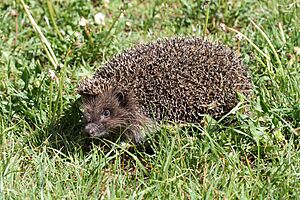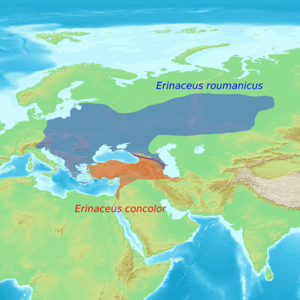Northern white-breasted hedgehog facts for kids
Quick facts for kids Northern white-breasted hedgehog |
|
|---|---|
 |
|
| In the grass | |
| Conservation status | |
| Scientific classification |
|
| Kingdom: | Animalia |
| Phylum: | Chordata |
| Class: | Mammalia |
| Order: | Eulipotyphla |
| Family: | Erinaceidae |
| Genus: | Erinaceus |
| Species: |
E. roumanicus
|
| Binomial name | |
| Erinaceus roumanicus Barrett-Hamilton, 1900
|
|
 |
|
| Range of the northern white-breasted hedgehog (blue) | |
| Script error: The function "autoWithCaption" does not exist. | |
Script error: No such module "Check for conflicting parameters".
The northern white-breasted hedgehog (Erinaceus roumanicus) is a type of hedgehog that lives in Eurasia. These spiky creatures are known for their white chests and are found across a wide area.
Contents
Where Northern White-Breasted Hedgehogs Live
These hedgehogs live in many places across Europe and Asia. You can find them as far west as Poland, Austria, and the countries that used to be former Yugoslavia. They also live south in Greece and on islands like Crete, Corfu, and Rhodes.
Moving east, they are common in Russia and Ukraine. Their home range stretches all the way to the Ob River in Siberia. They are quite common in all these areas, and their numbers seem to be doing well.
How Scientists Classify Hedgehogs
For a while, scientists thought the northern white-breasted hedgehog was just a type of another hedgehog, like the European hedgehog or the eastern European hedgehog.
However, in the 1990s, new studies looked closely at their genes and bodies. These studies showed that the northern white-breasted hedgehog is its own unique species. There are also five different types, called subspecies, within this species. These are E. roumanicus roumanicus, E. roumanicus bolkayi, E. roumanicus drozdovskii, E. roumanicus nesiotes, and E. roumanicus pallidus.
How Hedgehog Size Varies
The size of northern white-breasted hedgehogs can be different depending on where they live. Hedgehogs found in warmer parts of southern Europe tend to be larger than those in cooler northern Europe.
Their size is also affected by the weather. Hedgehogs are often bigger in places with higher temperatures. However, if there's a lot of rain, especially in the summer, the hedgehogs might be smaller.
Hedgehogs and Tiny Hitchhikers
Northern white-breasted hedgehogs often live near people, even in cities. Because of this, they can sometimes carry tiny creatures called parasites. These are small organisms that live on or in another animal and get their food from it.
Hedgehogs can carry different kinds of ticks, like the hedgehog tick (Ixodes hexagonus) and the common European tick (Ixodes ricinus). Ticks are tiny bugs that can attach to animals and sometimes humans.
Scientists have also studied the fleas that live on these hedgehogs. Fleas are tiny jumping insects. Because hedgehogs live in many places, including cities, their fleas (like Archaeopsylla erinacei) could sometimes spread to pets like cats and dogs. In some studies, scientists found tiny germs called bacteria inside these fleas. These bacteria include types like Rickettsia helvetica and Bartonella henselae.
 | Victor J. Glover |
 | Yvonne Cagle |
 | Jeanette Epps |
 | Bernard A. Harris Jr. |


